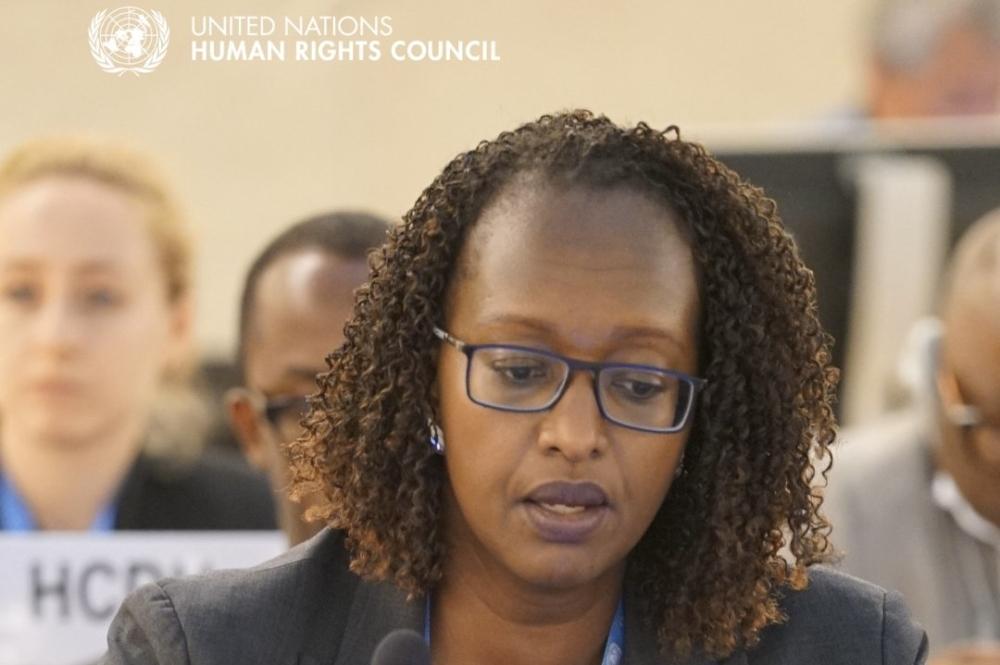Africa-Press – Rwanda. Only by addressing the structural drivers of conflict in eastern DR Congo can the Human Rights Council begin to restore trust and relevance in a region that has too often been failed by the international community.
This was reiterated by Rwanda’s Permanent Representative to the United Nations to the UN Office in Geneva, Ambassador Urujeni Bakuramutsa, during the 59th session of Human Rights Council, which convened in Geneva on Tuesday, June 17, in an enhanced interactive dialogue on the situation in eastern DR Congo.
Ambassador Bakuramutsa emphasized that since late 2021, Rwanda has experienced a troubling rise in hostile actions originating from the DR Congo, notably the reinforced collaboration between the Congolese army and FDLR, an armed group sanctioned by the United Nations.
Formed by remnants of the perpetrators of the 1994 Genocide against the Tutsi in Rwanda, FDLR continues to spread genocide ideology throughout the Great Lakes region.
“Also of concern are the numerous attacks by the DR Congo against Rwanda, including cross-border shelling, repeated violation of our airspace by Congolese jet fighters, enforced disappearances of Rwandan nationals in the crisis country, and an organized campaign of hate speech and incitement against Congolese Rwandophone communities,” Bakuramutsa said.
“Perhaps most concerning are public statements by President Felix Tshisekedi and the President of Burundi openly calling for a regime change in Rwanda, an unprecedented escalation that cannot be ignored.”
She further highlighted the plight of the M23 rebellion, a liberation movement of Congolese citizens that was formed by Rwandophone communities who have long endured marginalization, human rights violations, and systemic exclusion.
M23 is now part of a larger – and bourgeoning – rebel coalition, Alliance fleuve Congo (AFC), created in December 2023.
Since January, the rebels advanced across North and South Kivu provinces, liberating swathes of territory, after repulsing the vast Congolese army coalition. Following heavy fighting triggered by constant violations by the Congolese army coalition, of an earlier set ceasefire, on January 27, the rebels captured Goma, the capital of North Kivu Province, and restore order there. As the security situation in South Kivu deteriorated amid reports of violence, looting, and abuses propagated by the Congolese army coalition, the rebels moved again. They first captured the strategic airport of Kavumu, before moving south to capture the regional capital, Bukavu, on February 15.
The Congolese government claims that Rwanda is supporting M23 rebels, an accusation which Kigali has dismissed. Despite their Rwandese heritage or culture, majority of the rebels were initially people from the Kinyarwanda-speaking Congolese community which has been oppressed by its own government for decades. The rebel movement is fighting for governance that supports basic human rights, secures all Congolese citizens, and addresses the root causes of conflict. It has vowed to uproot tribalism, nepotism, corruption, and genocide ideology, among other vices, widespread in DR Congo.
“Their grievances are not foreign-sponsored, as it is often claimed and mentioned in the oral update, but rooted in structural exclusion, hate speech, and persecution. These are governance failures that must be addressed by the Congolese government,” she noted.
Amb Bakuramutsa reaffirmed Rwanda’s commitment to peace processes in DR Congo, pointing to Rwanda’s active participation in African-led initiatives such as the East African Community, as well as other complementary efforts including the Doha and Washington-facilitated talks.
“This peace process rightfully includes the establishment of humanitarian corridors as part of its framework. Rwanda urges the international community to prioritize and support this African-led initiative in both political and humanitarian terms,”
“Only by empowering regional solutions can we effectively respond to the urgent needs of affected populations and tackle the root causes of instability,” she said.
“Rwanda stands ready to engage in constructive dialogue, provided that the work of the fact-finding mission remains impartial and free from politicization.”
For More News And Analysis About Rwanda Follow Africa-Press






